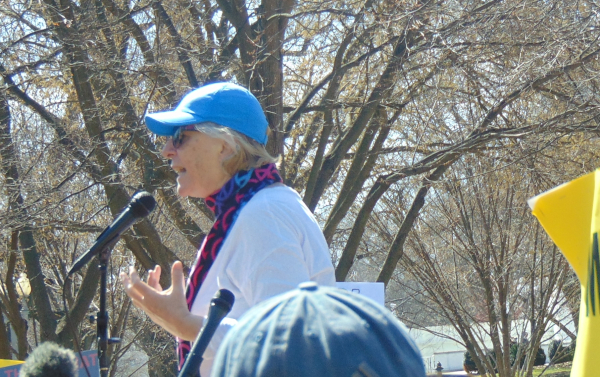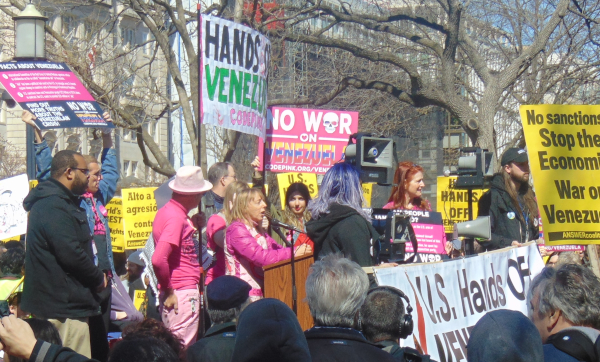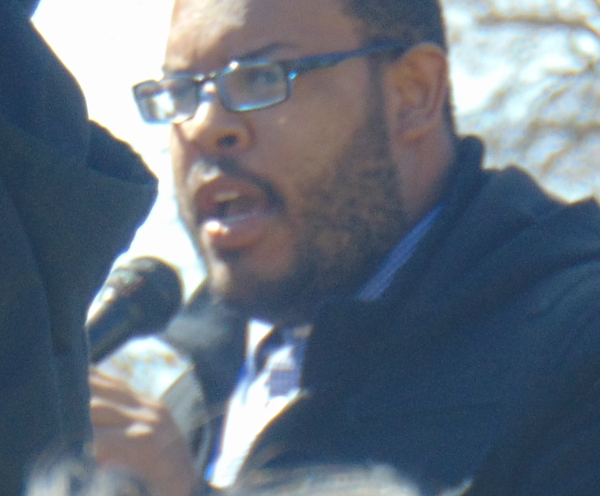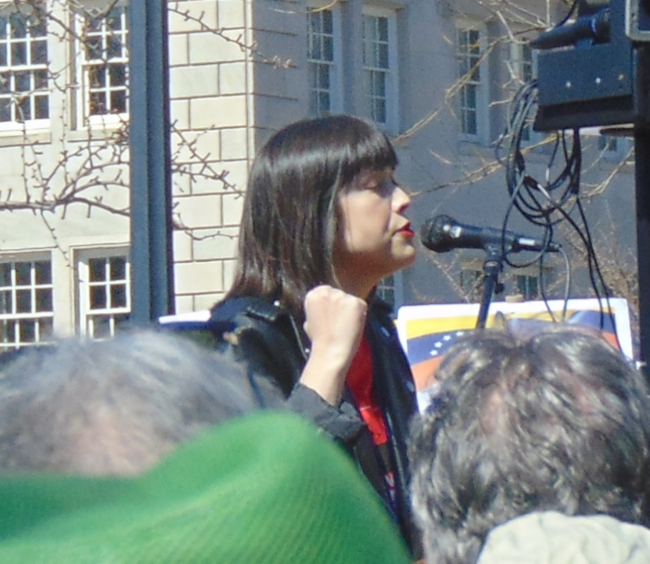Pro-Venezuela Anti-intervention march
Washington DC 16Mar2019
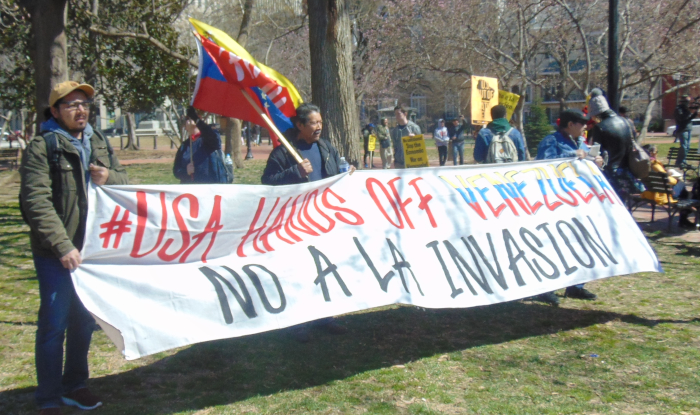
In Washington DC to protest the Trump Administtration's actions against
Venezuela. President Nicolás Maduro was sworn in on January 10th for a
second six-year term.
As NPR put it:
[Venezuela] was once Latin America's
wealthiest and is now devastated by
economic and social collapse. Many countries, including the U.S. and
neighboring Brazil and Colombia, refuse to recognize his leadership.
They say he won an election that was neither free nor fair.
On
January 23rd,
"the leader of the legislature, Juan Guaidó, declared himself acting
president and said he would assume the powers of the executive branch
from there onwards." The election was held back in May of last year.
The US officially recognized Juan Guaidó as the legitimate president of
the country.
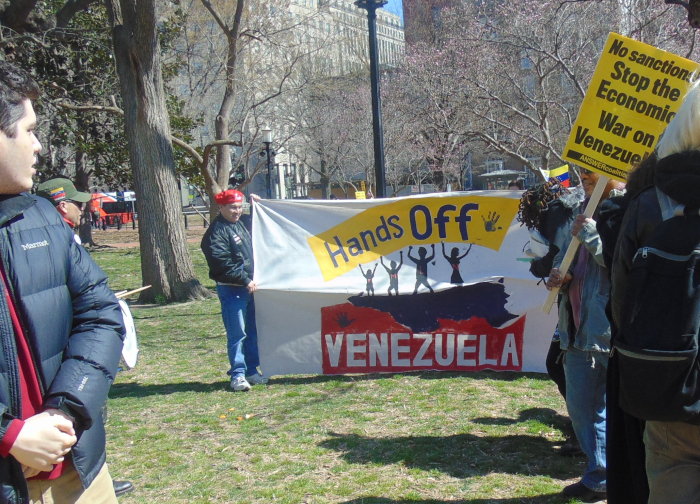
How does the military feel abut the two contestants?
Following the
events of 23 January, top military commanders tweeted their support for
Mr Maduro but videos posted on social media showed National Guard
members stepping aside at one opposition protest to let those marching
through.
The BBC describes the socialist policies of the previous
president, Hugo Chvez, as being poorly designed. Price controls were
put on basic necessities such as flour and cooking oil, but no
subsidies were provided to compensate businesses. The businesses,
finding these markets to be unprofitable, simply stopped producing for
them. A
baker in Caracas
explains that due to price controls,
bread must be sold at a loss —
for about 20 U.S. cents per loaf. So, like other bakery owners, he
reserves some flour for pizza and pastries that he can sell at market
prices to help keep his business afloat.
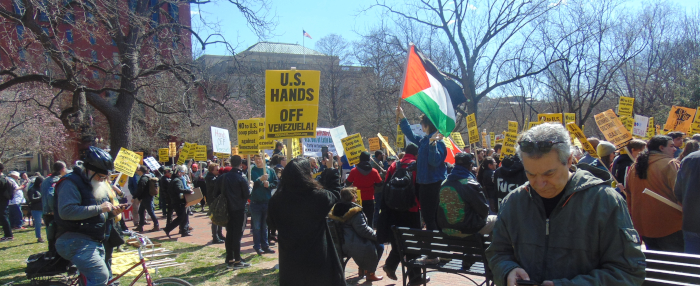
How many people did we have? Popular
Resistance said it was anticipating "thousands." My guess was
that we got 1,000 to 1,250. The
International Action Center
says that "Representing Workers World and the International Action
Center, Loan Tran and Taryn Fivek spoke from the stage to the
rally." The IAC alsor reported about 100 counter-protesters. The
IAC and ANSWER both took early action against the Iraq War that began
in 2003.
The top two speakers are Cindy Sheehan and Medea Benjamin, both
of whom were active against the Iraq War that started around 16 years
ago.
I saw the signs that some of the counter-protesters were carrying. Some
younger Venezuelans carried signs that said, in effect "We know you
enjoy watching Narcos
on Netflix, but how would like to live
under those sots of people?" To which my answer would be that as bad as
life was under Saddam Hussein of Iraq or Muammar Gaddafi of Libya, what
followed US intervention was much worse. Al
Jazeera said that in 2018
Amnesty International can confirm the
number of IDPs (internally displaced persons) in Iraq is over three
million now. The Iraqi government has unfortunately been a part of the
problem ... many of these people are displaced because of the actions
of the government and militias affiliated with the government.
And
also that "The reconstruction effort that was promised [by the Iraqi
government] has not even started in many cases." So my advice to the
younger Venezuelans would be to "Be careful what you wish for!"
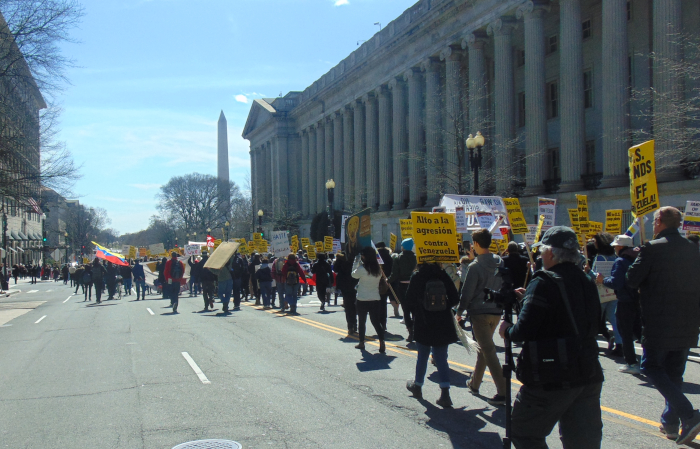
And how's Libya doing? According to Bloomberg
News
A long-delayed conference to reconcile
feuding Libyan
factions and pave the way to elections will be held next month, the
UN’s envoy to the country said Wednesday, voicing optimism the
gathering could help the OPEC member find stability after years of
turmoil.
So again, I wouldn't willingly trade their life now for what
they had under the dictator Gaddafi.
Both National Security Adviser John
Bolton and Senator Marco
Rubio (R-FL) are urging the Venezuelans to surrender. Rubio tweets:
There is still time for military
leaders in #Venezuela to
- maintain their rank
- be granted legal amnesty
- have U.S. sanctions removed; &
- participate in a transitional government
But only if they play a role in restoring democracy.
Hurry.
It only gets worse from here.
Does that sound like a threat to you? Sure sounds like a threat to me.
I would definitely take that
as a threat.
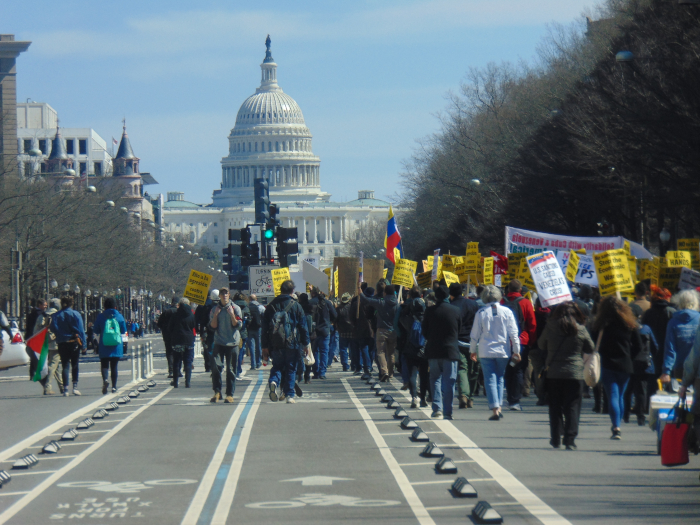
Youtube of speech and
marching
Elliot Abrams tries
to explain how Juan Guaidó is actually the president of Vanezuela
when Maduro hasn't left office Makes a complete botch of it.
The US mainstream media does not appear to recognize that there
are tremendous class and ethnic differences between the sides
represented by Maduro and Guaidó. The incumbent group since Chavez took
over and Maduro succeeded him are Mestizo (mixed-race) and poor. The
insurgent group led by Guaidó tends to be light-skinned and wealthy.
The light-skinned Venezuelans had complete control of the country's
politics for four centuries before Chevez took office. And this is very
important for understanding what's happening today:
Today, Guaidó’s supporters, like
Carmona’s, know they can’t win an election given the overwhelming fact
of the newly empowered Mestizo majority. So Guaidó has skipped the idea
of an election altogether, simply replacing running for office with the
“recognition” from Trump and allies which Guaidó can’t get from
Venezuelans.
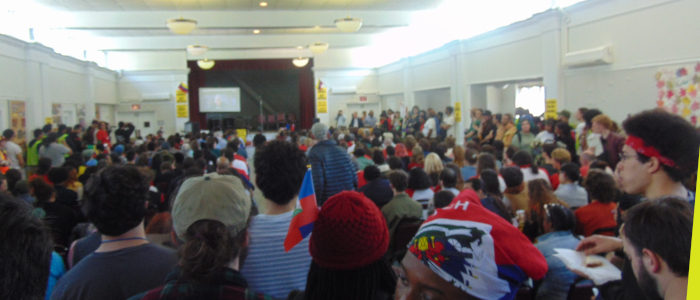
A large section of the march gathered in an upper room of the church
where we stopped to hear messages from Jill
Stein and Daniel Ellsberg, among others. We all went straight to
the buses after that.
So the US is battling hard to add to Venezuela's unforced economic
errors by
imposing as much economic pain as it possibly can.
As these sanctions escalate, the lives
of ordinary Venezuelans become steadily worse. Food and medicine are in
short supply, inflation is raging, and living standards have collapsed.
Government corruption and mismanagement fuel this freefall, but fiats
from Washington have decisively accelerated it.
Heh!
Although our leaders like to use the
phrase “targeted sanctions,” in most cases that is about as honest a
formulation as “clean coal.”
Is it working?
Beside the moral question is the
political one: do sanctions work? Evidence suggests that they do not.
The two countries that the United States has sanctioned for the longest
time, Cuba and Iran, have defiantly survived over generations without
changing their behavior.
With straight military invasion and covert operations both being
unfeasible, economic sanctions are about al we have and that doesn't
appear to be working, either.
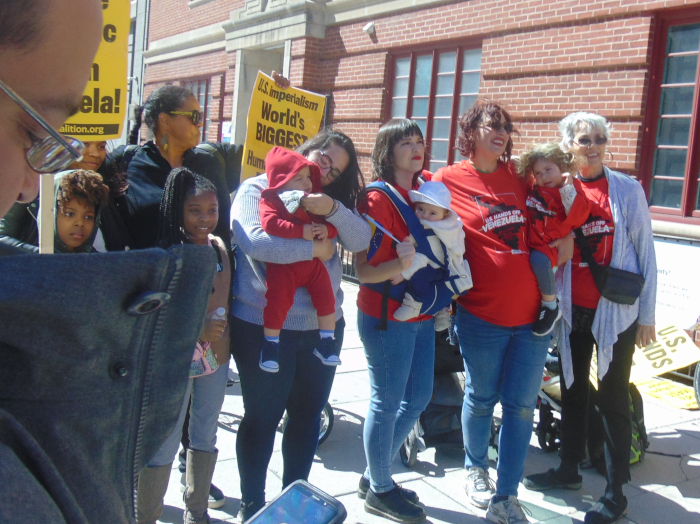
"What we're fighting for!"
Prawnworks
